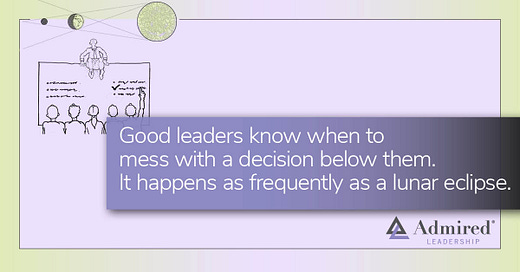Colleagues That Shop Decisions
On some teams, decisions are not final until others get a chance to “shop” them with the ultimate decision-maker.
In dysfunctional organizations, those impacted by a decision get the chance to skip over their direct leader and make their case directly to whoever has the power to reverse course. This sounds like dastardly behavior on the part of those seeking to overturn or influence a decision they don’t like. But the real issue belongs with the leader who is open to discussing decisions already decided below them.
Any time the leader above entertains the conversation regarding a decision below them with a team member who finds the mandate problematic, they undermine the credibility of the leader who made the decision. When this becomes a pattern, everyone joins the fray, shopping every decision they don’t like.
Worse yet, the ultimate decision-maker will confront a long line of team members waiting for their turn to influence a decision they contest. Leaders who allow for this behavior soon become a bottleneck for every decision. Nothing really gets decided before they hold court with everyone who wants to disagree with the decision.
Going over a colleague or leader’s head to discuss a decision with a more senior leader should only be reserved for those issues deemed immoral or so flagrantly bad they will create revolt.
This is not to say, leaders with an open-door policy should discourage conversation when others are disgruntled about a given decision. They should listen and engage. But should also make clear that they steadfastly refuse to get involved. They simply won’t influence even those decisions they question out of respect for the junior leader. When others know a leader won’t mess with decisions below them, they soon stop attempting the end around.
Less effective leaders like the feeling of power they get when opining and exerting influence on every decision. Unfortunately for them, this is no way to run a railroad. Their need for control and the desire to tinker with decisions below them bankrupts the ability of others to lead. Decision quality and acquiring buy-in both suffer.
Good leaders know when to mess with a decision below them. It happens as frequently as a lunar eclipse.




